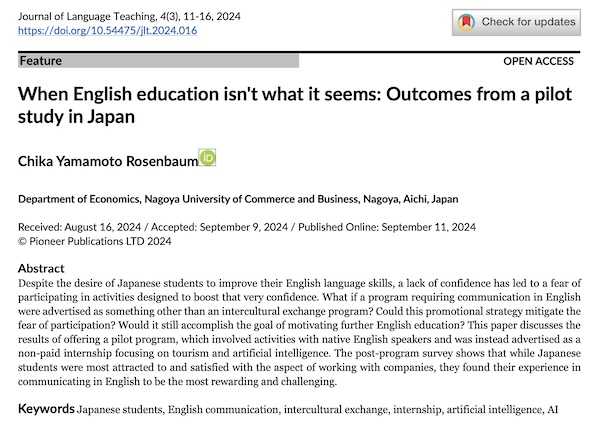When English education isn't what it seems: Outcomes from a pilot study in Japan
DOI:
https://doi.org/10.54475/jlt.2024.016Keywords:
Japanese students, English communication, intercultural exchange, internship, artificial intelligence, AIAbstract
Despite the desire of Japanese students to improve their English language skills, a lack of confidence has led to a fear of participating in activities designed to boost that very confidence. What if a program requiring communication in English were advertised as something other than an intercultural exchange program? Could this promotional strategy mitigate the fear of participation? Would it still accomplish the goal of motivating further English education? This paper discusses the results of offering a pilot program, which involved activities with native English speakers and was instead advertised as a non-paid internship focusing on tourism and artificial intelligence. The post-program survey shows that while Japanese students were most attracted to and satisfied with the aspect of working with companies, they found their experience in communicating in English to be the most rewarding and challenging.
References
Burden, P. (2020). Do Japanese university students want to study abroad? The Language Teacher, 44(2), 3-11. DOI: https://doi.org/10.37546/JALTTLT44.2-1
David, B. (2018). Fundamental problems with English education in Japan. Annual Report of the Faculty of Education, Gifu University: Teacher Education and Educational Research, 20, 139-148.
Hansen, J., & Loucky, J. (2010). Global understanding through international study: Learning from experience at an American university. Journal of Osaka Jogakuin College, 40, 37-69.
Howard, L. (2014). Why study abroad? An analysis of Kobe Kaisei students’ rationale for studying abroad. Kobe Kaisei Review, 53, 11-15.
Ikemoto, H. (2013). Japanese studying abroad: Motivation and trends. Human Culture Society, Kyoto University of Advanced Science, 1, 274-281.
Kojima, N., Uchino, T., Isobe, N., Tanaka, J., Nihonmatsu, M., Okamoto, Y., Miyake, Y., Jinnin, R., Yashiki, H., & Yoshihara, M. (2015). Inward-oriented Japanese students and international exchange. Bulletin of General Health Research, Hiroshima University Health Service Center, 31, 35-42.
Pruitt, W. (2021). Academic experiences that impact the study abroad propensity of college students. International Research and Review: Journal of Phi Beta Delta, 11(1), 5-24.
Reesor, M. (2003). Japanese attitudes to English: Towards an explanation of poor performance. NUCB Journal of Language Culture and Communication, 5(2), 57-65.
Rosenbaum, C. Y., Iwaki, N., & Tatsumi, Y. (2024). Survey on study abroad and international exchange: Students' awareness and future challenges. Annual Report of the Global Engagement Center at Nagoya University, 1, 5-16.
Saito, J. (2006). Why don’t Japanese students like to speak English in their task-based classes? Kanagawa University International Management Review, 32, 61-67.
Sponseller, A. C. (2021). Examining motivation to study abroad among Japanese undergraduates. Journal of Osaka Jogakuin College, 51, 255-279.
Yamaoka, K. (2009). Current situations and future aspects of Japanese English teaching. Ritsumeikan Studies in Language and Culture, 21(2), 35-45.

Downloads
Published
Issue
Section
License
Copyright (c) 2024 Journal of Language Teaching

This work is licensed under a Creative Commons Attribution 4.0 International License.




